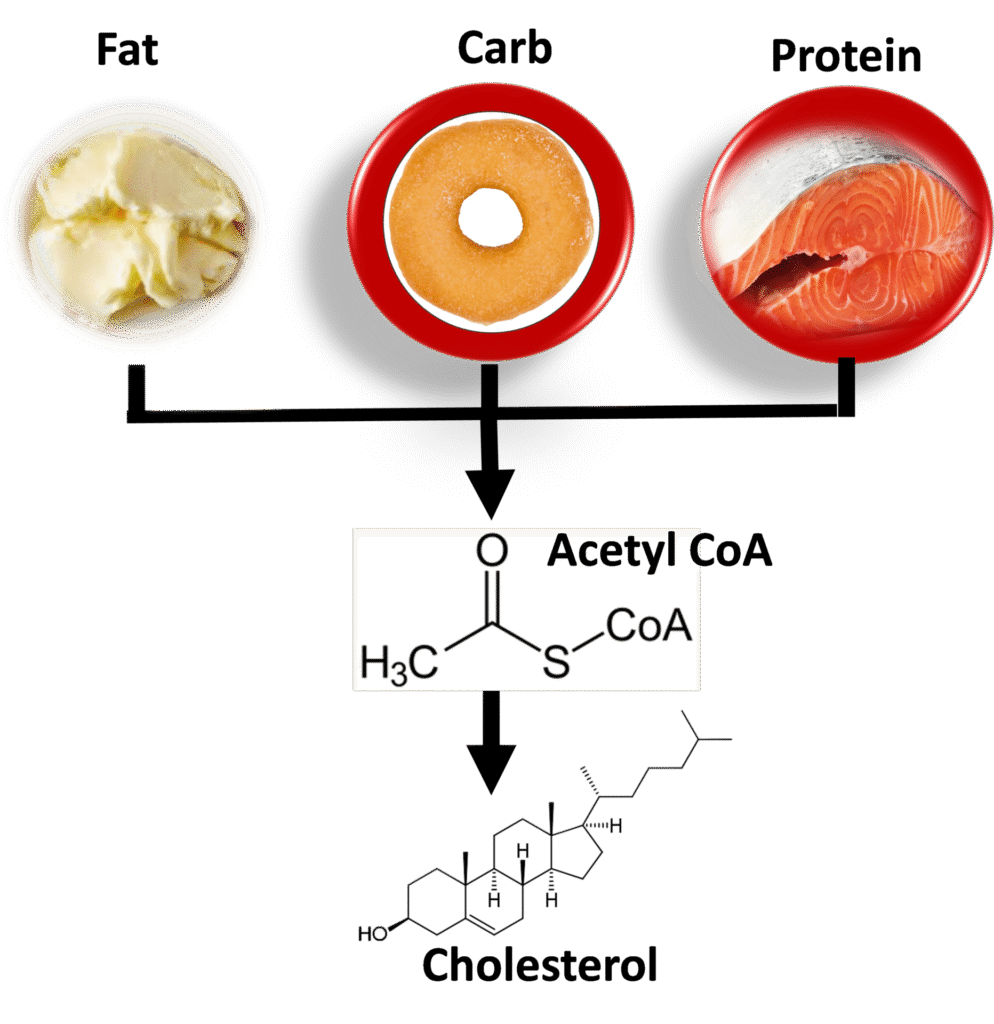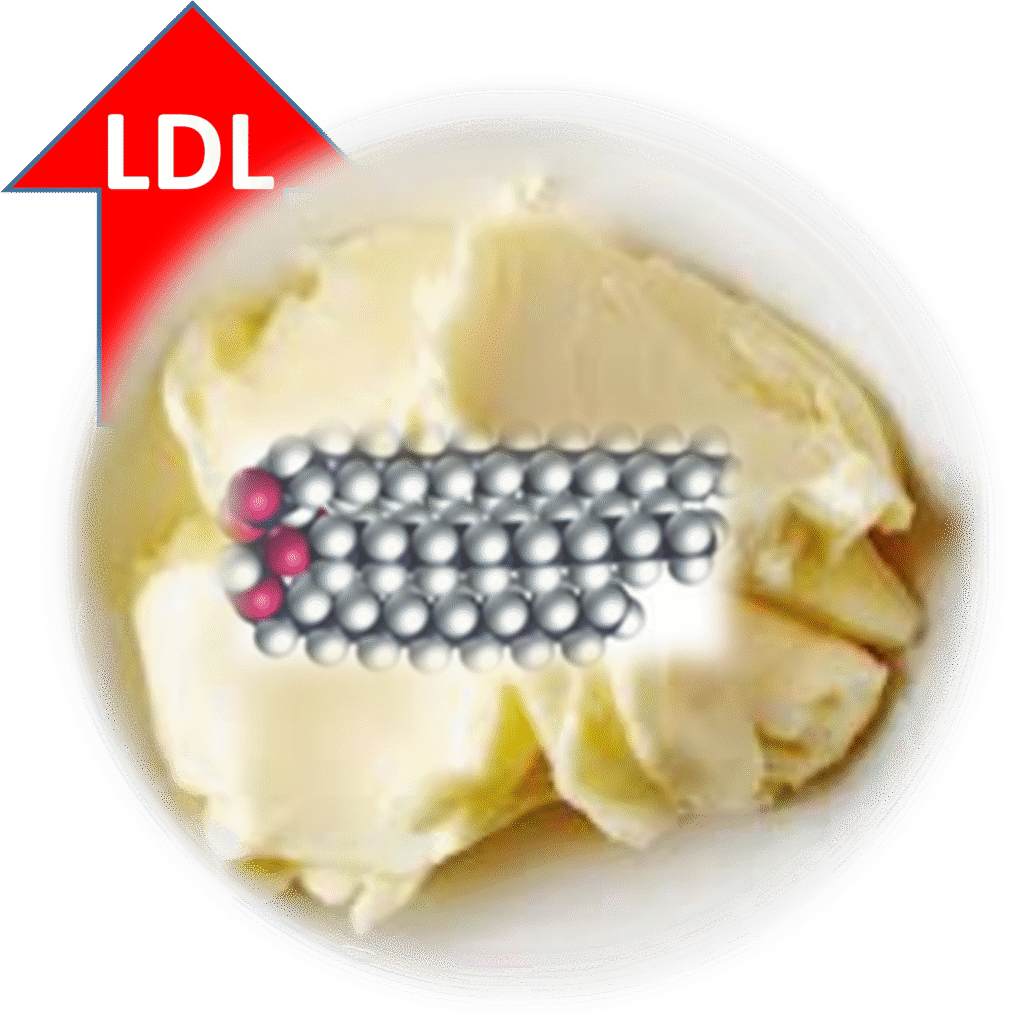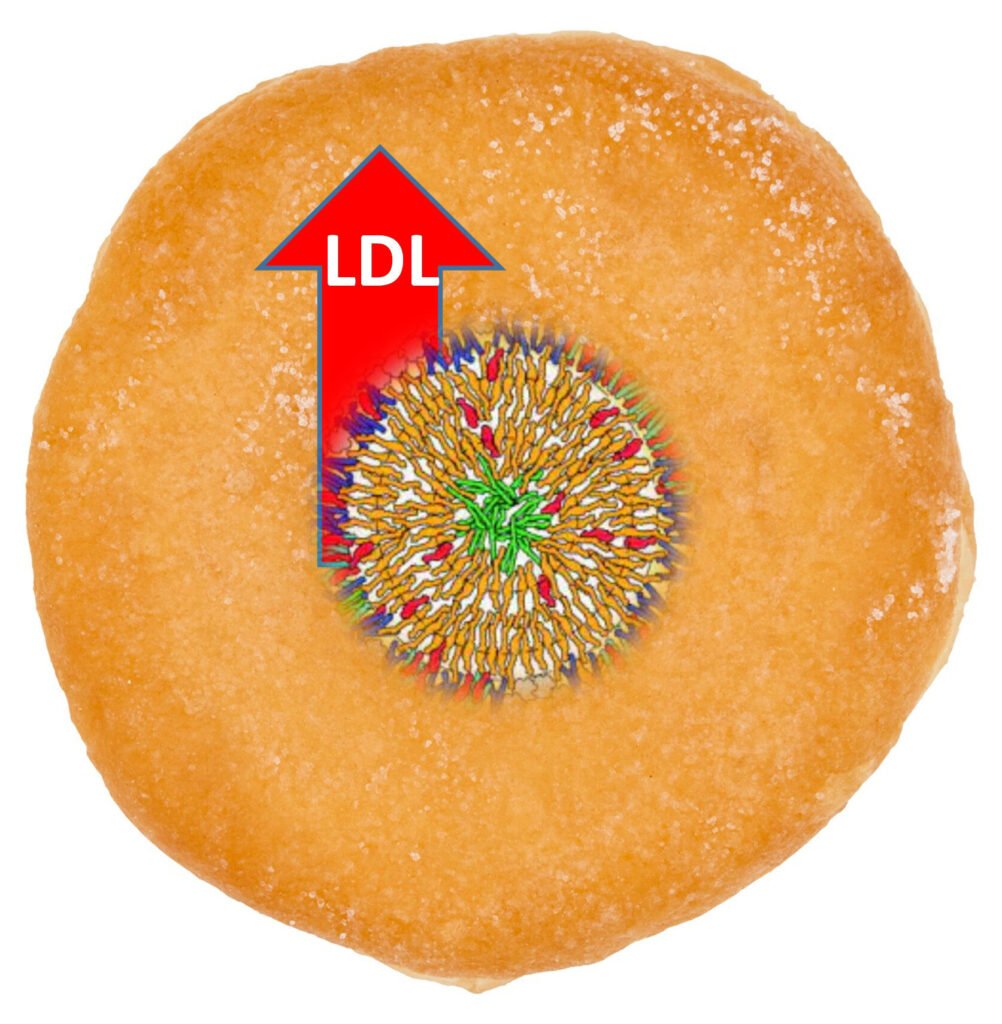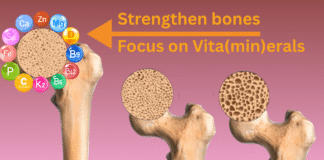Why is cholesterol important?
Cholesterol is central to several biological functions and is necessary for the synthesis of bile acids, steroid hormones and vitamin D. It also plays an important role in maintaining cellular membrane rigidity and fluidity. All steroid hormones (estrogens, progestin, testosterone, cortisol, aldosterone and androgens) are derivatives of cholesterol. Vitamin D3 (cholecalciferol) is also synthesized from a derivative of cholesterol (7-dehydrocholesterol) in the epidermal layer of skin on exposure to UV radiation. The bile acids, cholic acid and chenodeoxycholic acid, are made from cholesterol in the liver. These acids are then combined with amino acids to form water-soluble bile salts, which facilitate the digestion of lipids via emulsification and breakdown by pancreatic lipase.
How cholesterol is synthesized and transported
The body breaks down fats, carbohydrates, and proteins into acetyl-CoA, a key intermediate product of cellular metabolism. Cholesterol is synthesized from acetyl-CoA through a series of reactions, synthesis primarily takes place in the liver, though other cells also produce it in smaller amounts. Once synthesized, cholesterol is packed within the lipoprotein particles in the liver and is then transported through the bloodstream. There are two main types of lipoproteins that carry cholesterol through the bloodstream: LDL (low-density lipoprotein that carries a very high concentration of cholesterol) and HDL (high-density lipoprotein, primarily made of protein with a smaller amount of cholesterol and triglycerides). LDL carries cholesterol to cells throughout the body, while HDL collects excess cholesterol from the bloodstream and transports it back to the liver for removal from the body. The term “bad cholesterol” is used for LDL, as it contributes to the buildup of plaque in arteries, while “good cholesterol” for HDL is used to acknowledge its role in the clearance of cholesterol from the blood.

How much cholesterol is produced by the body?
The human body normally produces 1 g of cholesterol per day, but this production is adjusted by dietary intake of cholesterol i.e., production is reduced when dietary cholesterol is high and increased when dietary intake is low. It is believed that the body generally produces about 80% of the cholesterol it needs, and the remaining 20% comes from dietary sources. In actuality, if we go through the process of cholesterol synthesis then it is obvious that diet is not only the source of 20% direct cholesterol but also the source of ingredients (sugar and fat) required for the synthesis of 80% cholesterol in the body. This means that 100% cholesterol comes from diet.
Why is cholesterol regulation important?
Whereas cholesterol is necessary for the functioning of our cells, elevated levels of cholesterol are associated with many diseases. Secretion of excess cholesterol into the bile may cause precipitation of cholesterol, leading to the formation of gallstones (cholelithiasis). An increased level of circulating LDL (lipoproteins that carry a very high concentration of cholesterol) contributes to the buildup of plaque in arteries (atherosclerosis) and thus increases the risk of heart disease. Familial hypercholesterolemia refers to the mutation of the LDL receptor, where LDL receptors are unable to bind to LDL particles and therefore are unable to clear them from the blood circulation. This results in high cholesterol deposits in the blood vessels and coronary heart disease.
Diet, dietary cholesterol and LDL
Though dietary cholesterol can contribute to overall blood cholesterol levels, but its impact on LDL and HDL is unstipulated. Also, dietary cholesterol is not the same as blood cholesterol and cannot be categorized as either LDL or HDL.

Instead of dietary cholesterol, the impact of diet (in total) on LDL is noticeable and well-documented. Saturated fatty acids, if consumed in excess, may reduce the number and activity of the LDL receptors. LDL receptors are the proteins on liver cells that control the LDL level in blood by binding LDL particles in order to be broken down by the liver. The fewer the receptors available, lesser is the efficiency of the liver in removing LDL from the blood. Saturated fats may also increase free cholesterol in the liver by reducing the stored form of cholesterol (cholesterol ester). Unsaturated fatty acids increase hepatic LDL receptor activity, which increases the clearance of LDL from the blood. Unsaturated fatty acids also promote the formation of cholesterol ester and therefore decrease free cholesterol in the liver. PUFA also induce flexibility in the cell membrane, which in turn leads to an increase in the ability of LDL receptors to bind LDL. When we consume sugar, our body releases insulin to help cells to absorb the sugar. Excess sugar leads to increased insulin levels, which also increases fatty acid synthesis. The increase in fatty acid synthesis in the liver enhances triglyceride synthesis, which promotes LDL formation and secretion. Fiber may affect LDL in multiple ways. First, fiber is believed to decrease cholesterol absorption by the small intestine, which leads to a reduction of cholesterol in the liver. The decrease in liver cholesterol boosts LDL receptors, which ultimately decreases circulatory LDL. Second, fiber may reduce the absorption of bile acids which stimulates the utilization of hepatic cholesterol for the synthesis of bile acids, thereby decreasing LDL level in circulation. Finally, fiber on fermentation in the colon produces short-chain fatty acids which are assumed to inhibit cholesterol synthesis in the liver.

A recent clinical trial study conducted in 2025 examined the effects of dietary cholesterol vs saturated fat on LDL concentrations in 61 participants. The study found that 2 eggs daily as part of a low-saturated fat diet reduced LDL compared to high-saturated fat diet with only one egg/week. The study concluded that it is the saturated fat that elevates LDL not dietary cholesterol. Further, reviews of epidemiological data and clinical interventions from recent studies did not conclude any direct correlation between intake of cholesterol and cholesterol in blood.
Conclusion
Dietary saturated fatty acids and sugars increase circulatory LDL, while monounsaturated fatty acids and fiber keep LDL within limits. The effect of dietary cholesterol is not significant in the elevation of LDL
For further reading
- Association between espresso coffee and serum total cholesterol: the Tromsø Study 2015–2016
- The Effect of Diet on Cardiovascular Disease and Lipid and Lipoprotein Levels
- An overview of the cholesterol metabolism and its proinflammatory role in the development of MASLD
- Biochemistry, Cholesterol
- Dietary saturated fat and cholesterol: cracking the myths around eggs and cardiovascular disease
- The Effect of Diet on Cardiovascular Disease and Lipid and Lipoprotein Levels
- Impact of dietary cholesterol from eggs and saturated fat on LDL cholesterol levels: a randomized crossover study




